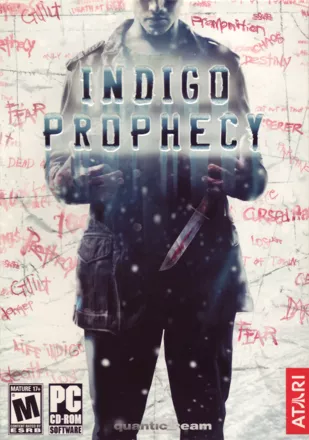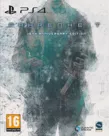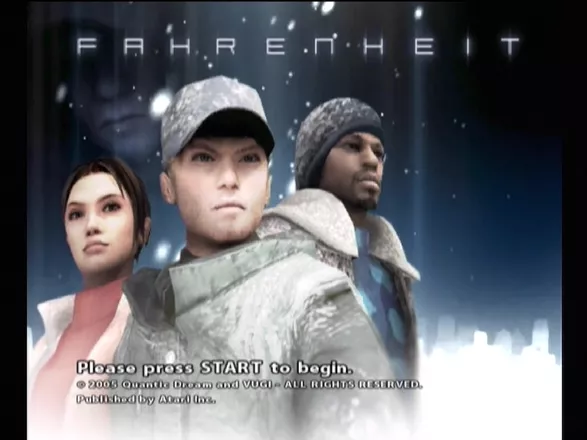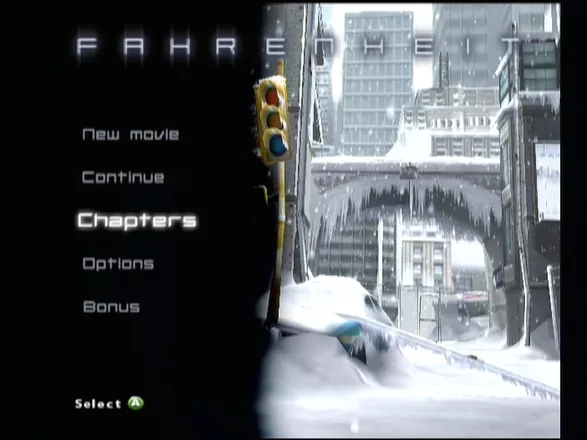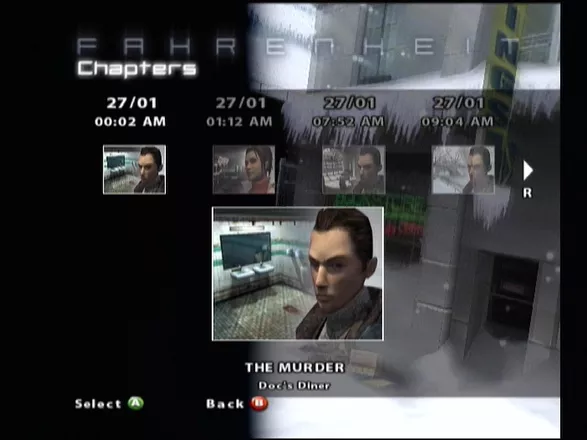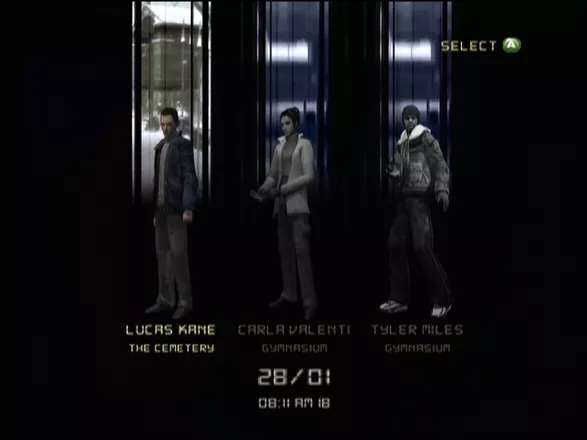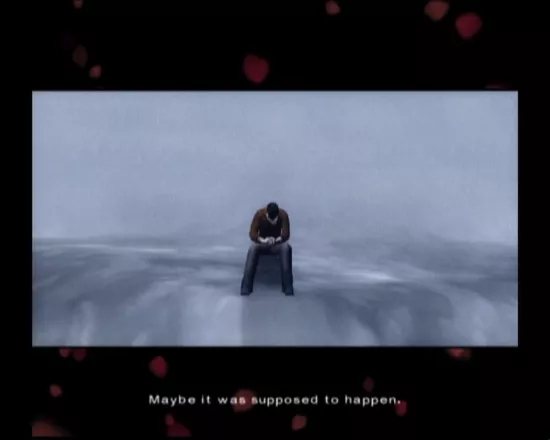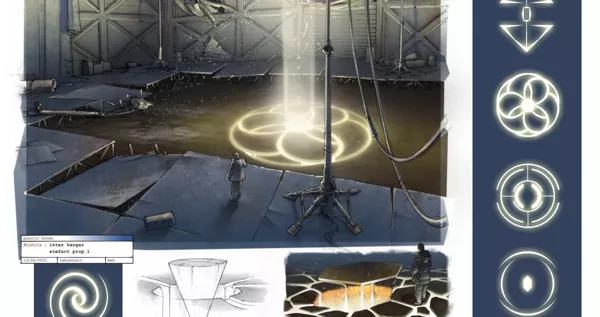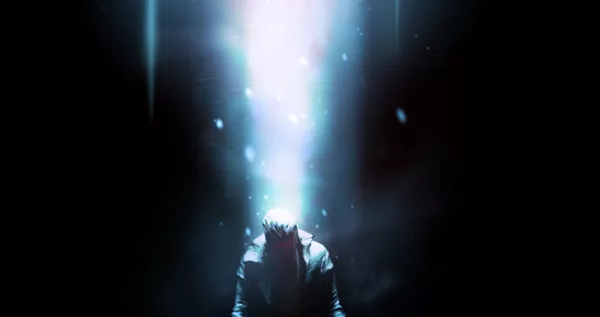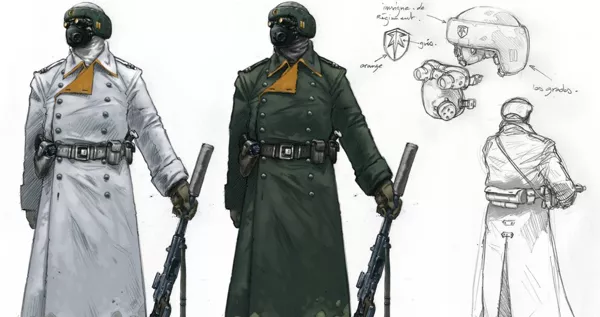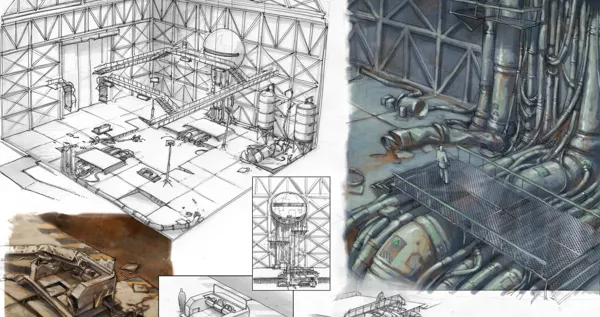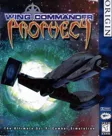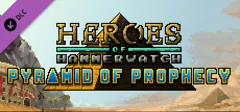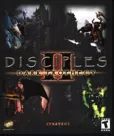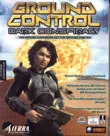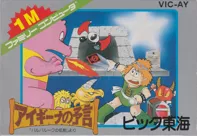Indigo Prophecy
Description official descriptions
January 2009. On a cold, snowy night in New York City, an ordinary citizen named Lucas Kane, under the control of an unknown force, unwillingly murders a complete stranger in a diner. Once he comes to senses, Lucas realizes he must escape while leaving as little evidence as possible behind. Barely managing to accomplish that, Lucas contacts his brother and tries to understand what has caused him to commit the crime, recalling the events of his own past in the process. Meanwhile, two police detectives investigating the murder, Carla Valenti and Tyler Miles, are determined to find the perpetrator, at the same time trying to deal with the personal problems of their lives.
Indigo Prophecy (Fahrenheit in Europe) is a psychological thriller in which the player is able to control different characters on both sides of a murder - the killer and those who are trying to find him. The game's core gameplay style is adventure. The three protagonists explore various locations, talk to other characters, and interact with the environment in order to advance. However, the game is heavy on various action-oriented sequences, from tasks that must be completed within a limited amount of time to quick time events, which require the player to press the correct button during a scene.
The game emphasizes realism in the player's interaction with the environment. For example, picking up a rag and cleaning the floor requires the player to move the mouse or the analog stick back and forth, imitating the actual movements of the object. Dialogue with character often imposes time limits on the player; failure to choose the optimal response in time will prompt the game to choose another, not always the optimal one. The player's choice will sometimes influence the subsequent events and the outcome of the entire story, eventually leading it to one of the three possible endings.
Cinematic treatment is evident in the game's handling of action-based gameplay and cutscenes, which are often seamlessly integrated into each other. An example of this is the split-screen technique, which is often used during the game's most dramatic moments: while the player is trying to complete the required action in time on one screen, another one displays what is happening around the controlled character.
Spellings
- 全面失控 - Traditional Chinese spelling
- 靛青预言 - Simplified Chinese spelling
- 인디고 프로페시 - Korean spelling
Groups +
- Best of Infogrames / Atari releases
- Gameplay feature: "Simon says"
- Gameplay feature: Multiple endings
- Indigo Prophecy / Fahrenheit games
- Nudity
- PC Gamer Presents games
- Protagonist: Hunter & Hunted
- Setting: City - New York
- Setting: Future now past
- Software Pyramide releases
- Technology: amBX
- Theme: Law enforcement
Screenshots
Promos
Videos
Add Trailer or Gameplay Video +1 point
See any errors or missing info for this game?
You can submit a correction, contribute trivia, add to a game group, add a related site or alternate title.
Credits (Windows version)
192 People (189 developers, 3 thanks) · View all
| Director | |
| Executive Producer | |
| Assistant Project Manager | |
| Production Assistant | |
| Engine Manager | |
| Platform Managers | |
| 3D Engine | |
| Tools Manager | |
| Tools | |
| Design | |
| Graphic Manager | |
| Lead Characters | |
| Senior Artist | |
| [ full credits ] | |
Reviews
Critics
Average score: 84% (based on 96 ratings)
Players
Average score: 3.8 out of 5 (based on 213 ratings with 15 reviews)
Beautiful suspense... On the edge, baby!
The Good
Indigo Prophecy is a trendsetter. This game is just so damn awesome that I don't know if I'll be able to word things correctly, but here goes nothing.
You start out at a diner, in the bathroom, on the throne. You're unconscious, fully clothed thank goodness. A man comes in and uses the urinal... you twitch.
He walks over to the sink slowly, while your body begins to shake and convulse rather violently. He's washing his hands, and you step out of the stall, staggering like a wooden puppet. A small steak knife is in your hand, and you lift it. Your head lifts up, revealing your face. A grimace of death and agony is upon you, and your eyes are rolled back. The man sees you in the mirror, and turns around just in time to catch the blade in the heart. He falls to the ground, you on top of him, struck silent in horror and pain as you raise the blade high into the air again, and strike again. You lift the blade one more time, and plunge it into the last artery, completely severing the man's heart. You raise your hands in the air, covered in blood, head looking upwards as you almost seem to levitate, still twitching violently. All of a sudden, SLAM.
You fall the the ground, waking up as if from a deep sleep. You don't remember what the hell just happened, but you know that if you don't cover this up quickly, someone is going to find out. You drag the body into a stall and mop up the blood, and then wash your hands of the stain of your sin. A cop tells the cook to hold onto his food, he needs to use the restroom. You don't have long. You leave in a rush, with the option to pay for your food calmly or just rush out like a bat out of hell... You think you got away, but they're on your heels like bloodhounds... Who did this to you? What the hell even happened? It all unravels in my favorite game for Xbox: Indigo Prophecy.
I love that game so damn much. The game's graphics are eye-candy, and the storyline just gets deeper and deeper and drags you in with it. User controls allow easy movement and control of objects around your house, such as a stereo with real working music, a sink, a fridge, the works.
The voice-acting and sounds are sublime! Everything... to tell you the truth, it's just like a freaking movie! It's just so damn good!
The Bad
Well, it had to end for one. Also, I wished that some things that you do/see/hear have a little more... explanation. This game has basically no flaws...
The Bottom Line
The best game for Xbox, in my opinion. Rent first, but a definite buy. Rent first so you can make sure you're okay with the controls and method of talking.
Xbox · by Kain Ceverus (30) · 2007
Tries to do something different and new - and mostly succeeds
The Good
It played like a movie; I know David Cage and company tried to do this. And I think they pretty much succeeded. I like that there is an actual plot, and that it is not all mindless button-mashing (although there is a fair amount of that). They tried to do something creative and new in terms of the controls, and this alone makes this game worth taking a look at. The visuals and on-screen presentation are also very good. This is a really well-conceived game.
The Bad
As others have commented, the controls can be very hard to get the hang of. I started with a Saitek gamepad, which gave good Force feedback effects but lacked the precision necessary to succeed at any of the button-mashing levels. I eventually tried an XBox 360 gamepad (more expensive, but worth it) which was the only gamepad precise enough to allow me to advance through the levels. With the standard driver, Force feedback was not an option. After some tweaking, I finally managed to get the open-source XBCD driver installed and configured to my wishes, which gave me good Force feedback. As installed, I doubt the gamepad configuration suits anyone.
The Bottom Line
It's like playing an interactive novel. The story is fairly open-ended and is directed by the player. Some of the levels are quite fun by themselves, but ultimately it is the story that drives everything. Being European, there's more emphasis on sex and less on violence - which is quite refreshing. Some more branches in the story might have been nice, but it's quite rewarding as it is. I played it through to get to (and see) the various game endings, also to see the various branches and hear the different dialogue threads. I would really like to see more games like this.
Windows · by thud (97) · 2009
An immersive, deep, emotional game that will keep you at the edge of your seat
The Good
When I first heard about Indigo Prophecy, I was stoked. Finally a game that wasn’t linear, that allowed you to do things and find out things yourself. I couldn’t wait to get my hands on this title and I finally got to rent it this week.
The games main focus is the story, rather than action. It takes the form of being a movie, with the director addressing you in the beginning of the game, telling you that you now have complete control over the action of the movie AND the dialogue. The basic drive of the game is not like a sand box game, but the actions you feel most natural taking affects the plot in every way, right down to the order you do things. And God they did it perfectly.
The story starts off pretty simple: you were possessed by some unknown being and forced to commit a murder. Now you, Lucas Kane, are on the run from the police. The story is brilliantly made though. Even though you control the game, the game makes sure that sooner or later you get all of the essentials in before the game is over. As it develops a deep, dark, twisting plot emerges that will blow you away.
The best part easily about this game is the fact that YOU control the story. Where it goes is completely up to you. You reveal the story through directing what the characters say. You choose the best way to reveal a story. Suppose you want to make the story completely baffling until the end of the story. Okay. All you have to do is make sure that the dialogue that takes place doesn’t reveal too much. Or maybe you want to reveal bits and pieces and then towards the end, all of the pieces fall into place. Or even if you want a good, slowly developing story that reveals it as you go, it doesn’t matter. You control all of the characters (or at least all of the main characters), and as a result, you have the welcoming feeling that you control the storyline, and it doesn’t control you.
Now, not only do you control the way the story is revealed, but also what is in it. My making certain decisions, you can completely alter the content of the story. For example, if you make the right decisions, you are able to save your brother from death. However, if you make the wrong decisions, your brother will die a tragic death. This combined with the fact that you control how the story is revealed makes for one of the greatest video games experiences ever.
As a result, the game has tons of endings to it. Not only will game play be different every time, but the story will be as well. And every time you do it the dialogue will be different, resulting in a new story every time you play it. Some games claim to have open-ended game play with branching storyline. But Indigo Prophecy is far from a branching game. It is never set up before you play, but instead it alters itself depending on what you choose during the game, to ensure a good changing storyline as you go, and that the story isn’t predictable.
Game play consists of a combination between story parts and action sequences. Story sequences are usually in the form conversations, which you have direct control over. You can choose to talk to someone or not, which reveals certain parts of the story. You can ignore premonitions that the character gets and go with your gut instinct. Directing the story is easy, as the direction you want the story to go in is directly reflected in character’s dialogue options. You have to choose a conversation option quickly, as you have a time limit to choose an option. Also, you don’t get to go back and make all of the choices because most of the time the game will only allow you to ask a few questions, not all of them, or the option to make one choice will disappear once you ask another. This keeps the game from getting stale and letting you ask all the questions you want.
Because the game’s main focus is the story, this does not mean it has no action scenes. In fact, action scenes make up a good part of the game. Instead of moving around with the character as most games would, you hit buttons on the screen to ensure that your character gets out of the scene alive. There are two types of button mashing to do. The first is pressing L1 and R1 repeatedly to make sure that the character can withstand something for a prolonged period of time. An example of this is hanging from a rail or pushing against strong winds. The other, and more common, test is moving the analog sticks when told to do so. Two circles with four colored sides appear at the bottom of the screen. When one side lights up, you push that side with the right or left analog stick as indicated. Sometimes this can get very intense. Sometimes two directions appear at once, and a lot of times it gets VERY fast, especially when you’re dodging something. As a result, quick reflexes and good hand-to-eye coordination is needed to stay alive. Failing a test means losing a “life”. Lose all your lives and you must restart from the last save point.
Interaction with objects and people is innovative. You use the right analog stick to choose options in interaction, as well as choosing options in a conversation. Even doing other actions you use the analog. Like if your are climbing over a fence, you first have to push your analog right to move your leg out, and then swing it up to swing up your leg, which gives a great immersive feel to it. The use of the analog sticks gives a great smooth feel to interaction in the game, as it uses your thumbs and avoids the use of having to pull your fingers up to the buttons to play.
During the game, the screen splits up to reveal two sides of what is happening. It sometimes warns you of incoming cops, while other times it is just for a flashy show. It adds to the illusion of a living, breathing world around you, because it shows you that other thing go on while you aren’t there. This definitely adds to the immersion of the game.
The characters are some of the best you will encounter in a story based game. In the beginning you will be presented with characters that aren’t cardboard cut-outs at all. They seem real, and the game designers went to great lengths to make them seem like they have emotions. When they hear bad news, their facial expressions become solemn and sad, but when they become aggravated, they become tough and anxious. By the end of the game, you will become attached to even the game’s main enemy, who is mysterious and powerful in every way. The voice acting is superb on all of them, which makes the game seem more realistic. There is almost no cheesy lines in the game, which make the characters more believable
The graphics, while I will not say are revolutionary, are satisfactory for a game like this. Graphics had to be toned down just slightly to make room for more memory for storyline. But I will assure you it was worth every byte of memory. The graphics are far from crappy, and you will find that they are perfect for a game such as this. The character models are done well, and facial expressions are clear and crisp.
A great part of the graphics is that all pre-rendered cut scenes are done completely with the game’s game play engine, so you will fell that when a cut scene comes, it does not break away from the immersion of it. Instead, the cut scenes flow with the game play perfectly, as there is no lag before or after the cut scene, and graphics are the same as the game play graphics. As a result, cut scenes do not cut into the game, but flow seamlessly in and out of game play, which is good, because cut scenes can occur unexpectedly and surprisingly anytime during the game.
Sound is surprisingly good. Directed by Angelo Badalamenti, the music is well fit for each situation. It becomes tense at the right moment and sad at the perfect moment, to add a great deal of immersion to the game. You will be gripped by the main theme, a sad combination of violins and other instruments, which lends to the games dark atmosphere. Sound effects are done quite well, so that they don’t seem fake, which again contributes to the immersion.
Finally, a great feature is the use of “chapters” throughout the game. The game automatically creates chapters, so that when you are done the game you can go back and make new decisions at key points in the plot. It also has an amazing system in choosing. You can choose to play the chapter in a new save file, and by doing so you can create multiple stories without ruining your old one. Also, if you are done with the story you are on, you can choose to go back and overwrite your old story with a new one. This way, creates multiple storylines is easy, and you don’t have to mess with multiple save files for multiple stories.
Finally, the game obviously has some great replay value. You can choose to keep replaying the game for a while before the overall story gets boring, and even that will take a while. This game has one of the greatest stories, and some of the most lovable characters to boot.
The Bad
While a game such as this seems flawless, it is not perfect.
Even though you can change the story around a lot, you can throw something new in every time. The story is flexible, but it still has a basic backbone of the same story. Even when you replay the game, you will still know the story already, and you can’t throw something new in like killing a character or refusing to progress the story. As a result, the game will only be tolerable a few times through until you get bored of the story, even if you can change the way its told every time.
I would like to point out that while the interaction controls are fun and good, moving around can be a nightmare. The problem is that the game gets its movement controls from the position of the camera. However, the controls do not adjust accordingly when the camera changes. As a result, the directions feel mixed up. You could be moving down when in fact you are pushing left on the controller. This can make some of the parts frustrating. LUCKILY, the game has no major parts where you have to dodge bullets manually, or where you have to run manually, so we have a good break there.
The game is pretty short. Even on my first time through I was able to beat it within 6-8 hours. As a result, the game completely relies on the replay factor. Fortunately, the game changes every time you play, and as a result every time you start a new story, the game doesn’t get any shorter. It relies on your ability to make good decisions, not your skill at the game, so game will never be shorter the more you play them.
Action sequences are fast and action-packed, but unless you can look in two directions at once, you will be staring at the bottom of the screen for the most part. They are perfect for any matrix fan to enjoy, but in order to get past these scenes you will be continuously watching the bottom two circles for your next move. The lucky part is that you can go back to watch all of the action sequences again in bonuses to have a nice look at what you might have missed.
On top of this, sometimes when you miss your chance to hit a direction, you miss every other one as well. Imagine something like DDR. Once you miss one, sometimes it is going so fast that you miss every one after it until you get your rhythm back again. However, this happens very rarely during the game, and most times you won’t notice.
Also, they could have done way more in an action sequence than just use the bottom two circles. You feel that pressing directions on the analog sticks will get repeating, and even the occasional pressing of the L and R buttons won’t mix things up much, and you just can’t help but wonder why they didn’t add some more stuff to it than that. I mean, the way they used the controller during the game was fairly impressive, so why couldn’t they just add a little more to mix things up a bit?
Another problem is the lack of something to do BESIDES the story. Out of the main game, the title really has nothing else to offer. It includes some extra unlockable content like “making of” films or concept art, which you can unlock through collecting “bonus cards” throughout the game. However, this only gives you about a half an hour or so extra content before you get through it all.
The Bottom Line
This title is definitely something to look at if you are tired of bland FPS and shooters where the entire game is how many bullets you can pump into. If you are a fan of a deep, intriguing plot and likable characters then this is definitely a game for you. Whether you want to buy it or not, this is a game for you to definitely try out once. I would recommend that you rent this game first, to make sure that you can handle replaying it, as that is where this game gets its most of its content. I would also recommend renting it due to the fact that not all gamers can go a long time in a game without shooting something. If you love the game then, and want to be able to go back to it time after time, then this is a game for you to get!
PlayStation 2 · by Matt Neuteboom (976) · 2005
Discussion
| Subject | By | Date |
|---|---|---|
| Skipping cutscenes | DreinIX (10408) | Sep 25, 2009 |
Trivia
1001 Video Games
Fahrenheit appears in the book 1001 Video Games You Must Play Before You Die by General Editor Tony Mott.
Cut Content
In the U.S. version, the sex scenes have been toned down to maintain a Mature rating.
Development
- Fahrenheit was first announced as an episodic game. With this business model, Quantic Dream wanted to sell the game at a budget price, and then release monthly episodes and half-yearly bundles. This concept allowed for cliff-hangers, red herrings, mysteries, and surprises, with a new build-up in hype every month. Ultimately, they did not go along with it and released the game as a whole, at a regular price.
- The game was in development for five years - two years to create the tools and engine, two years to develop the game, and an additional year to sell it to the publisher.
Genre
The developers themselves do not call the game an adventure, but rather interactive drama, a story that is evolving according to the player's choices in the game, where gameplay is the story. It consists of bending stories, with a beginning, a middle and an end, but everything in between can be stretched or has multiple paths.
Publishing
The game was first to be published by Vivendi Universal, but developer and publisher parted ways in November 2004 because of differences in creative vision.
References
- Early in the game when the player wakes up as Tyler there is a desk in the bedroom with an action figure on it that when checked says: "This is a figurine of Sox, a character from my favorite videogame." Sox is a robot from another Quantic Dream game, Omikron: The Nomad Soul.
- At one point of the game there's also news about Omikron on the Internet. It can be accessed from Tyler's computer at the police station. Notice also how much the archive computer in the basement of the police station looks like a Commodore VIC-20.
- The concept of an Indigo Child is an actual theory, though not quite the same as the game presents it.
Technology
The game contains thirteen hours of full body and facial animation, which, according to the developers, has never been done in a video game, a TV series, or a film.
Tutorial
In the tutorial, the player is introduced to the game in a training room by director David Cage, not just with a voice-over, but using a rendered model as well. He also briefly discusses his creative vision.
U.S. Title
The decision to rename the game Indigo Prophecy in the U.S. was made by Atari. Fahrenheit suggests September 11th because of Michael Moore's critical film Fahrenheit 9/11, even though it's equally well known as a temperature scale, or in reference to Ray Bradbury's book Fahrenheit 451.
Awards
- 4Players
- 2005 – Best Adventure of the Year
- 2005 – Best Innovations of the Year
- GameSpy
- 2005 – PC Adventure Game of the Year
- 2005 – PC Adventure Game of the Year (Readers' Vote)
- Golden Joystick Awards
- 2005 - Unsung Hero of the Year* PC Powerplay (Germany)
- Issue 04/2006 - #2 RPG/Adventure in 2005 (Readers' Vote)
- Issue 02/2006 - Most Innovative Adventure in 2005
Information also contributed by Jeanne, Mr. Sefe, piltdown man and Zack Green.
Analytics
Upgrade to MobyPro to view research rankings!
Related Sites +
-
Developer's diary
An extensive post-mortem by director David Cage. -
FAQs and Guides
on GameFaqs.com -
Fahrenheit
Official Web Site -
UHS Hints for Indigo Prophecy
Nudges you along so you can try to solve the game yourself. Given in question and answer format. Includes full solutions. -
Walkthrough by Grawl
posted on GamesOver -
Zarf's Mini-Review
A mini-review of the PlayStation 2 version of Indigo Prophecy by Interactive Fiction developer Andrew Plotkin (June, 2006).
Identifiers +
Contribute
Are you familiar with this game? Help document and preserve this entry in video game history! If your contribution is approved, you will earn points and be credited as a contributor.
Contributors to this Entry
Game added by Jeanne.
PlayStation 4 added by Sciere. Xbox 360 added by Parf.
Additional contributors: Unicorn Lynx, Sciere, Zeppin, Paulus18950, Patrick Bregger, Rik Hideto, FatherJack.
Game added September 20, 2005. Last modified July 17, 2024.
